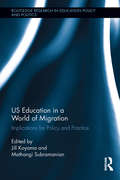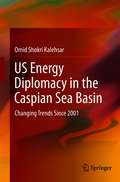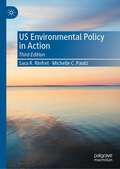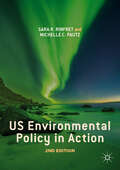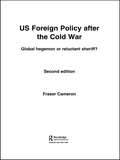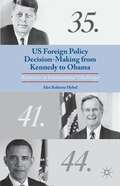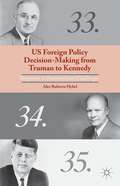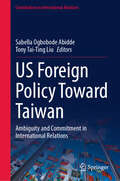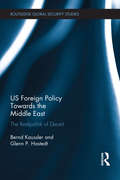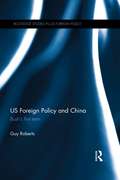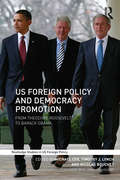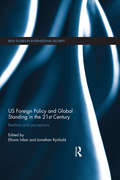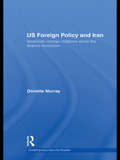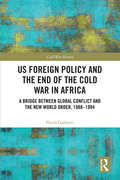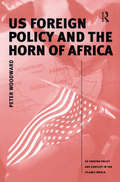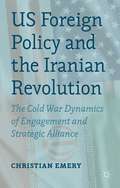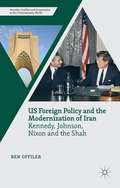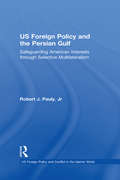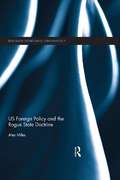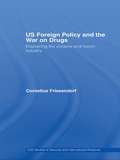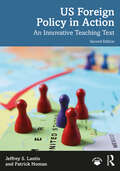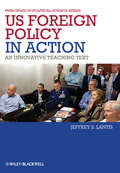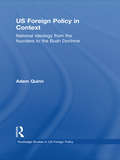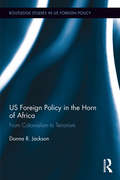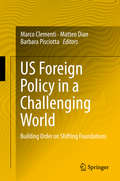- Table View
- List View
US Education in a World of Migration: Implications for Policy and Practice (Routledge Research in Education Policy and Politics)
by Mathangi Subramanian Jill KoyamaGiven the protracted, varied, and geographically expansive changes in migration over time, it is difficult to establish an overarching theory that adequately analyzes the school experiences of immigrant youth in the United States. This volume extends the scholarly work on these experiences by exploring how immigrants carve out new identities, construct meanings, and negotiate spaces for themselves within social structures created or mediated by education policy and practice. It highlights immigrants that position themselves within global movements while experiencing the everyday effects of federal, state, and local education policy, a phenomenon referred to as glocal (global-local) or localized global phenomena. Chapter authors acknowledge and honor the agency that immigrants wield, and combine social theories and qualitative methods to empirically document the ways in which immigrants take active roles in enacting education policy. Surveying immigrants from China, Bangladesh, India, Haiti, Japan, Colombia, and Liberia, this volume offers a broad spectrum of immigrant experiences that problematize policy narratives that narrowly define notions of "immigrant," "citizenship," and "student."
US Energy Diplomacy in the Caspian Sea Basin: Changing Trends Since 2001
by Omid Shokri KalehsarThis book provides the first comprehensive analysis of US policy from the perspective of an analyst and scholar from the region. This volume discusses the US energy diplomacy in the Caspian Sea region since 2001. It compares the foreign policy of the Bush, Obama, and Trump administrations, following the changing role of energy in the behavior of the US toward states in the energy hubs of Central Asia and the Caspian Sea. The chapters employ historical analysis, regional analysis, interviews, and case studies to trace the evolution of US interests in the area and posits likely trends for future policy. Topics discussed include: China’s massive Belt and Road Initiativethe energy and foreign policies of the Caspian littoral states in comparison with those of China, India, the European Union, and Turkeythe escalation of differences among key OPEC members during the Trump erathe impact of the oil price war on the US shale industrythe spread of COVID-19 and its impact on the oil marketRussian and U.S. competition in the EU energy marketthe US-China trade war and the role of energy in the first phase of the US-China trade dealthe energy policy of the incoming US President, Joe BidenShedding light on the complex geopolitics of the US-Caspian Sea Energy diplomacy, this volume will be of interest to researchers of foreign policy, diplomacy, international relations, and energy policy as well as policymakers and analysts working in related areas.
US Environmental Policy in Action
by Sara R. Rinfret Michelle C. PautzUS Environmental Policy in Action provides a comprehensive look at the creation, implementation, and evaluation of environmental policy, which is of particular importance in our current era of congressional gridlock, partisanship and polarization, and escalating debates about federal/state relations. With a continued focus on the front lines of environmental policy, Rinfret and Pautz take into account the major changes in the practice of US environmental policy during the Trump and Biden administrations. Providing real-life examples of how environmental policy works rather than solely discussing how congressional action produces environmental laws, this third edition of US Environmental Policy in Action offers a practical approach to understanding contemporary American environmental policy.
US Environmental Policy in Action: Practice And Implementation
by Sara R. Rinfret Michelle C. PautzUS Environmental Policy in Action provides a comprehensive look at the creation, implementation, and evaluation of environmental policy, which is of particular importance in our current era of congressional gridlock, increasing partisan rhetoric, and escalating debates about federal/state relations. Now in its second edition, this volume includes updated case studies, two new chapters on food policy and natural resource policy, and revised public opinion data. With a continued focus on the front lines of environmental policy, Rinfret and Pautz take into account the major changes in the practice of US environmental policy during the Trump administration. Providing real-life examples of how environmental policy works rather than solely discussing how congressional action produces environmental laws, US Environmental Policy in Action offers a practical approach to understanding contemporary American environmental policy.
US Foreign Policy After the Cold War: Global Hegemon or Reluctant Sheriff?
by Fraser CameronSince the success of the best-selling first edition, the world has remained fascinated with US foreign policy, not least because of the far-reaching consequences of the US led invasion of Iraq. This fully updated textbook follows the events of the past two and a half years including the 2004 presidential campaign, whilst still providing a comprehensive introduction to all aspects of American foreign policy. Chapter headings include: from colony to superpower the post-Cold War decade the role of Congress the media and public opinion the US and terrorism. Examining the administrations of George Bush, Bill Clinton and George W. Bush, it explains the complex interaction between the institutions of power, the key actors and the non-governmental organizations to give a complete picture of foreign policy. With a complete glossary of terms, this textbook is ideal for those studying American politics or international relations. Companion website available at: www.routledge.com/textbooks/0415358655
US Foreign Policy Decision-Making from Kennedy to Obama
by Alex Roberto HybelDuring the past fifty years, the United States has been involved in multiple wars. Alex Roberto Hybel's extensively documented book uses some of today's leading foreign policy decision-making models to analyze John F. Kennedy, Lyndon B. Johnson, Richard Nixon's distinct responses to the challenges emanating from Vietnam; George H. W. Bush's decision to defend Kuwait from the Iraqi occupation; George W. Bush's orders to invade Afghanistan and Iraq shortly after September 11, 2001; and Barack Obama's handling of perilous challenges in the nation's intervention in Afghanistan as he assumed the presidency. Throughout the book, Hybel meticulously explores each president's foreign policy decision-making process from the initial definition of the challenge to the moment the policy is formulated. Hybel pays special attention to each president's analytical process; the extent to which he relied on the counsel of his advisors; the mindsets that influenced his thinking and those of Washington's insiders; and the cognitive obstacles, if present, that afflicted his overall foreign policy decision-making process. Hybel concludes each analysis by identifying the model or models that best explains each president's approach to foreign policy decision-making and by assessing the quality of each president's approach to foreign policy formulation. His analyses provide in depth insights into to the way US leaders created foreign policies during unsettling periods.
US Foreign Policy Decision-Making from Truman to Kennedy
by Alex Roberto HybelThe book has three objectives: to expose students to the ways different US presidents handled major foreign policy making problems; to test the explanatory value of alternative decision-making models; And to reintroduce students to a wide range of critical US foreign policy issues.
US Foreign Policy Toward Taiwan: Ambiguity and Commitment in International Relations (Contributions to International Relations)
by Sabella Ogbobode Abidde Tony Tai-Ting LiuThe US-China -Taiwan relationship is multilayered and fraught, with widespread implications for the Indo-Pacific region. Utilizing the processes of historical periodization and analysis, this edited volume examines US foreign policy toward Taiwan between 1949 and 2023. Chapters are divided into two sections. Chapters in the first section are devoted to a chronological exploration of US -Taiwan relations during the Cold and Post-Cold War eras. Chapters in the second section delve deeper into specific policy concerns and tools, such as potential regional implications of the Russo-Ukraine war, strategic ambiguity/clarity and hedging policy, and island chain strategy. Illuminating the dynamics and complexities of the US foreign policy and decision-making process in a climate of seemingly perpetual contestation, this volume will be of interest to students and researchers of US foreign policy, East Asian history and politics, international relations, comparative politics, and conflict and security studies, as well as members of the diplomatic corps, governmental and non-governmental organizations, and those with an abiding interest in US-East Asian affairs.
US Foreign Policy Towards the Middle East: The Realpolitik of Deceit (Routledge Global Security Studies)
by Glenn P. Hastedt Bernd KausslerThis book offers a realist critique of US foreign policy towards the Middle East in the past decade. It critically examines four core foundations of contemporary US Middle East policy: US relations with Saudi Arabia after the Arab Spring; US diplomacy towards Iran and the Obama administration’s policy of engagement; the road to, and aftermath of, the 2003 US-led invasion of Iraq; and US policy towards nuclear-armed Israel. Because of a closely guarded bipartisan consensus, these four core foundations of contemporary US Middle East policy have largely evaded public criticism and scrutiny. This book argues that US strategy towards the Middle East has rarely been guided by order, stability and the national interest. Rather, successive administrations have created a house of cards built on a series of deceptions and constructed perceptions or myths. Combined, these four aspects of US Middle East policy have ushered in a decade of political violence, instability, sectarian divisions and an imbalance of power which has culminated in the territorial disintegration of Iraq and countries in the Levant as well as the rise of ISIS. Moving forward requires a rational pursuit of the national interest based on realist principles. This book will be of much interest to students of US foreign policy, Middle Eastern politics, security studies and IR in general.
US Foreign Policy and China: Bush’s First Term (Routledge Studies in US Foreign Policy)
by Guy RobertsThis work is an exploration of how U.S.-China relations were managed by President George W. Bush. Roberts argues that contrary to conventional wisdom, President Bush conducted a calculated, pragmatic and highly successful strategy toward Beijing, which avoided conflict, resolved crisis and significantly increased economic and diplomatic ties. Roberts identifies key players and polices of the Bush White House and the specific themes of engagement (successful and unsuccessful) that unfolded during Bush’s first term. Research is based on analysis of primary and secondary documentation, as well as interviews with key White House actors (including Deputy Secretary of State Richard Armitage), and two former Australian Prime Ministers. Topics of discussion include China’s changing attitude toward international engagement, China’s rising economic power and the tensions this triggered in the American establishment, the nature of U.S. China relations, contemporary and ideological understanding of the Bush Presidency as well as the strengths and weaknesses of different sources of information. US Foreign Policy and China will be of great interest to students and scholars of US foreign policy and China Studies.
US Foreign Policy and Democracy Promotion: From Theodore Roosevelt to Barack Obama (Routledge Studies in US Foreign Policy)
by Michael Cox Nicolas Bouchet Timothy J. LynchThe promotion of democracy by the United States became highly controversial during the presidency of George W. Bush. The wars in Iraq and Afghanistan were widely perceived as failed attempts at enforced democratization, sufficient that Barack Obama has felt compelled to downplay the rhetoric of democracy and freedom in his foreign-policy. This collection seeks to establish whether a democracy promotion tradition exists, or ever existed, in US foreign policy, and how far Obama and his predecessors conformed to or repudiated it. For more than a century at least, American presidents have been driven by deep historical and ideological forces to conceive US foreign policy in part through the lens of democracy promotion. Debating how far democratic aspirations have been realized in actual foreign policies, this book draws together concise studies from many of the leading academic experts in the field to evaluate whether or not these efforts were successful in promoting democratization abroad. They clash over whether democracy promotion is an appropriate goal of US foreign policy and whether America has gained anything from it. Offering an important contribution to the field, this work is essential reading for all students and scholars of US foreign policy, American politics and international relations.
US Foreign Policy and Global Standing in the 21st Century: Realities and Perceptions
by Jonathan Rynhold Efraim InbarThis book examines US foreign policy and global standing in the 21st Century. The United States is the most powerful actor in world politics today. Against this backdrop, the present volume examines how the foreign policies pursued by Presidents’ George W. Bush and Barack Obama have affected elite and public perceptions of the United States. By examining America’s standing from the perspective of different actors from across various regions, including China, Russia, Latin America and the Middle East, while also assessing how these perceptions interact with America’s own policies, this books presents a fresh interpretation of America’s global standing. In doing so, the volume evaluates how these perceptions affect the realities of US power, and what impact this has on moulding US foreign policy and the policies of other global powers. A number of books address the question of which grand strategy the United States should adopt and the issue of whether or not America is in relative decline as a world power. However, the debate on these issues has largely been set against the policies of the Bush administration. By contrast, this volume argues that while Obama has raised the popularity of America since the low reached by Bush, America’s credibility and overall standing have actually been damaged further under President Obama. This book will be of much interest to students of US foreign policy, US national security, strategic studies, Middle Eastern politics, international relations and security studies generally.
US Foreign Policy and Iran: American-Iranian Relations since the Islamic Revolution (Contemporary Security Studies)
by Donette MurrayUS Foreign Policy and Iran is a study of US foreign policy decision-making in relation to Iran and its implications for Middle Eastern relations. It offers a new assessment of US-Iranian relations by exploring the rationale, effectiveness and consequences of American policy towards Iran from the aftermath of the 1979 Iranian Revolution to the present day. As a key country in a turbulent region and the recipient of some of the most inconsistent treatment meted out during or after the Cold War, Iran has been both one of America's closest allies and an 'axis of evil' or 'rogue' state, targeted by covert action and contained by sanctions, diplomatic isolation and the threat of overt action. Moreover, since the attacks of 11 September 2001, Iran has played a significant role in the war on terror while also incurring American wrath for its links to international terror and its alleged pursuit of a nuclear weapons programme. US Foreign Policy and Iran will be of interest to students of US foreign policy, Iran, Middle Eastern Politics and international security in general Donette Murray is a Senior Lecturer in the Department of Defence and International Affairs at the Royal Military Academy Sandhurst. She was awarded a PhD in International History by the University of Ulster in 1997.
US Foreign Policy and the End of the Cold War in Africa: A Bridge between Global Conflict and the New World Order, 1988-1994 (Cold War History)
by Flavia GasbarriThis book investigates the end of the Cold War in Africa and its impact on post-Cold War US foreign policy in the continent. The fall of the Berlin Wall is widely considered the end of the Cold War; however, it documents just one of the many "ends", since the Cold War was a global conflict. This book looks at one of the most neglected extra-European battlegrounds, the African continent, and explores how American foreign policy developed in this region between the late 1980s and the early 1990s. Drawing on a wide range of recently disclosed documents, the book shows that the Cold War in Africa ended in 1988, preceding the fall of the Berlin Wall. It also reveals how, since then, some of the most controversial and inconsistent episodes of post-Cold War US foreign policy in Africa have been deeply rooted in the unique process whereby American rivalry with the USSR found its end in the continent. The book challenges the traditional narrative by presenting an original perspective on the study of the end of the Cold War and provides new insights into the shaping of US foreign policy during the so-called ‘unipolar moment’. This book will be of much interest to students of Cold War history, US foreign policy, African politics and international relations.
US Foreign Policy and the Horn of Africa (US Foreign Policy and Conflict in the Islamic World)
by Peter WoodwardExamining US involvement in the Horn of Africa, this volume addresses the relationship between the US and the Islamic movement in this region. Peter Woodward explores the interests of the United States in the region through two cases: Sudan and Somalia. He also discusses the effects of the Eritrean-Ethiopian war on US policy and posture in the region, along with the effects of other regional wars. The book looks at the relationship between US perceptions of Islamism and brings a unique perspective to the ongoing debate over US policy in the Islamic world. It will be of interest to those working in or researching foreign policy, as well as peace, security and conflict issues.
US Foreign Policy and the Iranian Revolution
by Christian EmeryThis book provides a fresh perspective on the origins of the confrontation between the US and Iran. It demonstrates that, contrary to the claims of Iran's leaders, there was no instinctive American hostility towards the Revolution, and explains why many assumptions guiding US policy were inappropriate for dealing with the new reality in Iran.
US Foreign Policy and the Modernization of Iran: Kennedy, Johnson, Nixon, and the Shah (Security, Conflict and Cooperation in the Contemporary World)
by Johnson Kennedy Nixon the ShahUS Foreign Policy and the Modernization of Iran examines the evolution of US-Iranian relations during the presidencies of John F. Kennedy, Lyndon B. Johnson, and Richard M. Nixon. It demonstrates how successive administrations struggled to exert influence over the Shah of Iran's regime domestic and foreign policy.
US Foreign Policy and the Persian Gulf: Safeguarding American Interests through Selective Multilateralism (US Foreign Policy and Conflict in the Islamic World)
by Jr Robert J. PaulyRobert J. Pauly, Jr examines the history of US foreign policy toward the Greater Middle East in general and focuses specifically on the fundamental economic, military and political causes of the 1990-1991 Persian Gulf crisis. He investigates to what extent these causes were internal and external in origin, looks at the principal actors in the crisis, and determines whether and how these actors have continued to drive unfolding events in the Persian Gulf ever since. The volume explores in detail the role of American leaders since 1989, including how far the US should collaborate with Europe to pursue both American and collective Western economic, military and political interests in the Gulf. It also considers the prospects for the future of American-led nation-building operations in Iraq and the outlook for the eventual liberal democratization of the Greater Middle East.
US Foreign Policy and the Rogue State Doctrine (Routledge Studies in US Foreign Policy)
by Alex MilesConcerns over Iran’s nuclear programme, North Korea’s nuclear brinkmanship and, in the past, Iraq’s apparent pursuit of WMD have captured the world’s attention, and dominated the agenda of the American foreign policy establishment. But, what led policymakers and the US military to emphasise the threat of rogue states at the end of the Cold War? Going behind the vivid language of the ‘axis of evil’ and portrayals of undeterrable and reckless rogue states, this work demonstrates how the rogue state doctrine satisfied both domestic and international goals in the Clinton and George W. Bush administrations, underpinning efforts to maintain US leadership and hegemony. It offers a clear picture of the policymaking process, taking a broad, historical approach that places the actions of US officials towards Iraq, Iran, North Korea, Libya and Cuba in a wider context. Through an understanding of the long-standing influences on the US approach we are better able to appreciate why, for instance, regime change dominated the post-9/11 agenda and led to the overthrow of Saddam Hussein. Explaining in detail how the tackling of rogue states became a central aim of US foreign policy, Miles examines whether there was continuity between the Clinton and Bush approach. He moves on to highlight the influence of Congress on the implementation of US policies and the difficulties the US faced in ‘selling’ its approach to allies and adapting its hard-line strategies to reflect developments within the targeted states. By considering the impulses and drivers behind the development of the rogue states approach, this work will extend the scope of existing work in the field and will be of interest to scholars and policymakers alike.
US Foreign Policy and the War on Drugs: Displacing the Cocaine and Heroin Industry (Css Studies In Security And International Relations)
by Cornelius FriesendorfThis book examines the geographic displacement of the illicit drug industry as a side effect of United States foreign policy. To reduce the supply of cocaine and heroin from abroad, the US has relied on coercion against farmers, traffickers and governments, but this has only exacerbated the world's drugs problems.US Foreign Policy and the War on Dr
US Foreign Policy in Action: An Innovative Teaching Text (Principles Of Political Science Ser.)
by Jeffrey S. Lantis Patrick HomanThis book represents a timely exploration of the dynamics of U.S.foreign policy development. It introduces historical developments and theories of U.S. foreign policy and engages students in the politics and debates of the foreign policy process (both directly and by proxy) through innovative learning exercises. This book offers a rich understanding of the politics behind clashing perspectives towards contemporary foreign policy challenges ranging from immigration policy controversies to COVID-19 pandemic responses, climate change to the China trade war. All of these issues are presented in dynamic ways that focus on activism and engagement in the policy process—and so this text speaks directly to a new generation of college students who have mobilized to political activism. The book is intended to serve as a core text for classes on U.S. foreign policy at the 200-level or above and will appeal to a broad audience. New to the Second Edition: Provides insights on contemporary foreign policy challenges facing the Biden administration and future presidents, such as climate change, the rise of China, sanctions and trade policies, and changing U.S. engagement in the Middle East. Offers stronger theoretical foundations for the study of domestic constraints in the foreign policy decision-making process, including the power of interest groups and political polarization in Congress. Explains pedagogical treatments of online and hybrid learning applications, along with presenting new exercises to engage students both in person in the classroom and online. Presents more detailed and critical historical analyses of U.S. foreign policy, including greater attention to the U.S. as an imperial power and its implications for politics and society. Creates new and exciting active learning exercises for instructors and students, including role-playing simulations of global public health crisis management and group research projects on cybersecurity and immigration policy. Enriches the graphics and illustrations of foreign policy actors and processes in a full-color presentation. Analyzes contemporary foreign policy issues in the Trump and Biden administrations. Adds new web components and features, some authored by undergraduate students who are becoming experts in U.S. foreign policy. Includes new writing exercises and assignments designed to promote creative and critical thinking about foreign policy actors and processes.
US Foreign Policy in Action: An Innovative Teaching Text (Principles of Political Science #6)
by Jeffrey S. LantisThis innovative teaching text on United States foreign policy interprets the foreign policy decision-making process through the lens of political debate and exchange. It introduces historical developments and theories of U.S. foreign policy and engages students in the politics of the foreign policy process through innovative learning exercises. Features critical analysis of contemporary trends in U.S. foreign policy, including debates in the Obama administration, foreign policy and the 2012 presidential election, and reaction to the Arab Spring Written by an award-winning teacher-scholar in international relations, with extensive experience in both policy making and pedagogy Views foreign policy decision making through the lends of political debate Offers fresh perspectives on historical developments as well as surveying prominent foreign policy theories Includes new and innovative participatory learning exercises exploring a range of themes including executive/ legislature conflict Contains extensive teaching and learning applications, including discussion questions, document templates, worksheets, suggested readings, and links to web resources throughout
US Foreign Policy in Context: National Ideology from the Founders to the Bush Doctrine (Routledge Studies in US Foreign Policy)
by Adam QuinnThis work blends strategic analysis of contemporary US foreign policy with long-term historical discussion, producing an important argument relevant to the debates surrounding both the merits of contemporary US foreign policy and the long-term trends at work in American political culture. Rather than a detailed historical study of the Bush administration itself, the book seeks to locate Bush within the historical context of the US foreign policy tradition. It makes the case for nationally specific ideological factors as a driver of foreign policy and for importance of interaction between the domestic and the international in the emergence of national strategy. The contemporary element focuses on critiquing the George W. Bush administration’s National Security Strategy, perceived by many as a radical and unwelcome ideological departure from past policy, and its broader foreign policy, concentrating especially on its embrace of liberal universalism and rejection of realism. This critique is supported by the cumulative argument, based upon the historical cases, seeking to explain American leaders’ persistent resistance to the prescriptions of realism. Quinn argues for some causal connection between historically evolved ideological constructions and the character of the nation’s more recent international strategy. Providing a valuable addition to the field, this book will be of great interest to scholars in American politics, US foreign policy and US history.
US Foreign Policy in The Horn of Africa: From Colonialism to Terrorism (Routledge Studies in US Foreign Policy)
by Donna Rose JacksonExamining American foreign policy towards the Horn of Africa between 1945 and 1991, this book uses Ethiopia and Somalia as case studies to offer an evaluation of the decision-making process during the Cold War, and consider the impact that these decisions had upon subsequent developments both within the Horn of Africa and in the wider international context. The decision-making process is studied, including the role of the president, the input of his advisers and lower level officials within agencies such as the State Department and National Security Council, and the parts played by Congress, bureaucracies, public opinion, and other actors within the international environment, especially the Soviet Union, Ethiopia and Somalia. Jackson examines the extent to which influences exerted by forces other than the president affected foreign policy, and provides the first comprehensive analysis of American foreign policy towards Ethiopia and Somalia throughout the Cold War. This book offers a fresh perspective on issues such as globalism, regionalism, proxy wars, American aid programmes, anti-communism and human rights. It will be of great interest to students and academics in various fields, including American foreign policy, American Studies and Politics, the history of the Cold War, and the history of the Horn of Africa during the modern era.
US Foreign Policy in a Challenging World
by Matteo Dian Marco Clementi Barbara PisciottaThis book examines how the US is dealing with the challenge of reconciling its global interests with regional dynamics and how it is able to produce and sustain order at the system level and within regional subsystems. The book comprises four parts, the first of which addresses global issues such as nonproliferation, trade, and freedom of the seas. US policies in these areas are carefully analyzed, considering whether and how they have been differently implemented at the regional level. The remaining parts of the book focus on the US posture toward specific regions: Europe, the Middle East, and East Asia. The policies adopted by the US to confront the most relevant challenges in each region are identified, and the ways in which policies in a specific region influence or are influenced by challenges in another region are explored. The book is a rich source of knowledge on the nature of the balance that the US has pursued between global and regional interests. It will be of much interest to scholars, to practitioners, to postgraduate/PhD students of international relations theory and American foreign policy, and to all with an interest in the ability of the US to produce international order.
